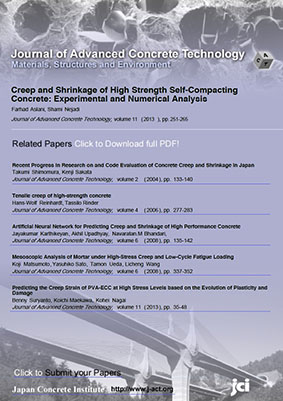
- |<
- <
- 1
- >
- >|
-
 Ippei Maruyama, Wataru Kotaka, Bui Ngoc Kien, Ryo Kurihara, Manabu Kan ...2021 Volume 19 Issue 10 Pages 1052-1060
Ippei Maruyama, Wataru Kotaka, Bui Ngoc Kien, Ryo Kurihara, Manabu Kan ...2021 Volume 19 Issue 10 Pages 1052-1060
Published: October 08, 2021
Released on J-STAGE: October 08, 2021
JOURNAL FREE ACCESSCountermeasures against carbon dioxide emissions are a concern in the construction field as well as in society. To solve this problem, a concept for new calcium carbonate concrete is proposed, and this concept is validated experimentally. In the proposed concept, calcium carbonate comprising Ca originating from demolished concrete or other Ca-containing industrial wastes and HCO3- from CO2 gas collected from the air or emitted by industrial plants acts as a binder for aggregates, which can be natural rocks or crushed demolished concrete. This short paper describes the details of the process of making calcium carbonate concrete and discusses future perspectives.
View full abstractEditor's pickJACT selected this paper for this year's outstanding article (2021.7-2022.8).
Download PDF (5784K) -
Sayuri Tomita, Kazuko Haga, Yoshifumi Hosokawa, Kazuo Yamada, Go Igara ...2021 Volume 19 Issue 10 Pages 1061-1074
Published: October 29, 2021
Released on J-STAGE: October 29, 2021
JOURNAL FREE ACCESSFor safe disposal of the large volume of concrete waste generated during the decommissioning of the Fukushima Daiichi Nuclear Power Station (F1NPS), the state of Cs and Sr contamination in concrete waste must ideally be estimated in advance during waste disposal planning. Cs and Sr are primarily adsorbed by calcium silicate hydrate (C–S–H) in cementitious materials. However, the amount of adsorption varies greatly with the Ca/Si mole ratio (C/S ratio) of C–S–H and with the presence or absence of coexisting elements, both of which vary according to interactions with the environment. This study attempted to model on the results of experiments on Cs and Sr adsorption by synthetic C–S–H with varying C/S ratios. Furthermore, for verifying whether the model can be applied to F1NPS, the results calculated by the model were compared with the experimental results for Cs and Sr adsorption on cement paste subjected to environmental conditions (carbonation, leaching, and presence or absence of coexisting elements (Na, K)). It was confirmed that the present model is overall able to reproduce Cs and Sr adsorption behavior on cement paste, considering changes due to environmental conditions.
View full abstractDownload PDF (1301K) -
Chie Oda, Daisuke Kawama, Hiroyukiu Shimizu, Steven J. Benbow, Fumio H ...2021 Volume 19 Issue 10 Pages 1075-1087
Published: October 29, 2021
Released on J-STAGE: October 29, 2021
JOURNAL FREE ACCESSConcrete in a transuranic (TRU) waste repository is considered a suitable material to ensure safety, provide structural integrity and retard radionuclide migration after the waste containers fail. Modelling of concrete degradation often focuses solely on solid-water chemical reactions and related changes in porosity, however, cracking and damage from steel corrosion will likely exert significant control over the mass-transport properties of concrete. In the current study, coupling between chemical, mass-transport and mechanical, so-called non-linear processes that control concrete degradation and crack development were investigated by coupled numerical models. Application of such coupled numerical models allows identification of the dominant non-linear processes that will control long-term concrete degradation and crack development in a TRU waste repository.
View full abstractDownload PDF (2610K)
- |<
- <
- 1
- >
- >|